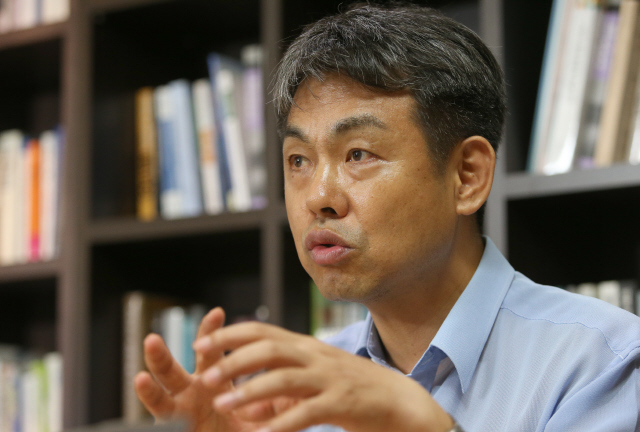Posted on : Aug.5,2015 17:04 KSTModified on : Aug.5,2015 17:04 KST
 |
Kim Chang-soo, Korea National Strategy Institute director |
Concerns being raised that the US’s military presence is being used as a counter to a rising China
As the US-China rivalry becomes more defined and inter-Korean relations change, the nature and standing of US Forces Korea (USFK) has become the topic of ever greater debate. Long a stabilizing presence in a divided Korea, USFK is now being called an advance guard in checking China, leading some to fear that a backlash from Beijing could further hamper the peninsula’s eventual reunification. The Hankyoreh sat down with Korea National Strategy Institute director Kim Chang-soo in Seoul‘s Yeouido neighborhood on July 31 to hear his take on the significance of USFK’s changing role.
Hankyoreh (Hani): There’s been talk about how USFK’s role has been changing from a line of defense against North Korea into a check against China.
Kim Chang-soo (Kim): It‘s a worst-case scenario. Imagine what would happen if there’s a conflict between China and Japan in the Senkaku (Diaoyu) Islands. We can’t rule out the possibility of the US getting involved through its alliance with Japan, and then South Korea getting pulled in through its alliance with the US. If USFK bases near the West [Yellow] Sea at Pyeongtaek and Osan function as outposts in the containment of China, South Korea will end up getting dragged into conflict in Northeast Asia.
Hani: Do you think it’s possible for a Chinese backlash against USFK to become a factor impeding reunification between North and South Korea?
Kim: China can‘t quarrel with the South Korea-US alliance or USFK in and of themselves. What it takes issue with is the deployment of weapons that threaten China, like THAAD (the Terminal High Altitude Area Defense anti-ballistic missile system). It also doesn’t want a kind of “unification by absorption” scenario that would leave it facing off against US forces across its borders.
Hani: Is there any way to preventing a backlash from China?
Kim: A lot of the animosity between North Korea and the US forces could be resolved through steps such as an inter-Korean confederation and peace agreement signing. If we pursue reunification in that manner, there may not be a large USFK facing China directly across its borders.
Hani: Has the South Korean government developed any ideas for the role and future of USFK after reunification?
Kim: The one who had the most pioneering debate on a post-reunification role for USFK was Kim Dae-jung [South Korean President from 1998-2003]. During the inter-Korean summit of June 15, 2000, he communicated that the USFK would “have to remain even after reunification for the sake of peace and stability in Northeast Asia,” and [then-North Korean leader] Kim Jong-il said, “That accords with my perception.” After that, the debate over USFK became more energized. South Korean government officials started talking about maintaining and using USFK as a precaution against an uncertain security situation after unification. As for myself, I called for a different role. My idea was that the USFK should be scaled down after unification from a deterrent against the North to a balancing power in Northeast Asia.
Hani: Do you think it will be that easy to change USFK’s role?
Kim: It’s important what role South Korea plays. One part it could play would be forming an East Asia energy and logistics community and seek out common interests among North Korea, the US, and China. Those common interests could then be used to balance the role of USFK. But if the US goes ahead with its current strategy of containing China instead of serving the preserve the regional balance, then USFK is going to be single biggest hurdle in the reunification process.
By Kim Ji-hoon, staff reporter
Please direct questions or comments to [english@hani.co.kr]

